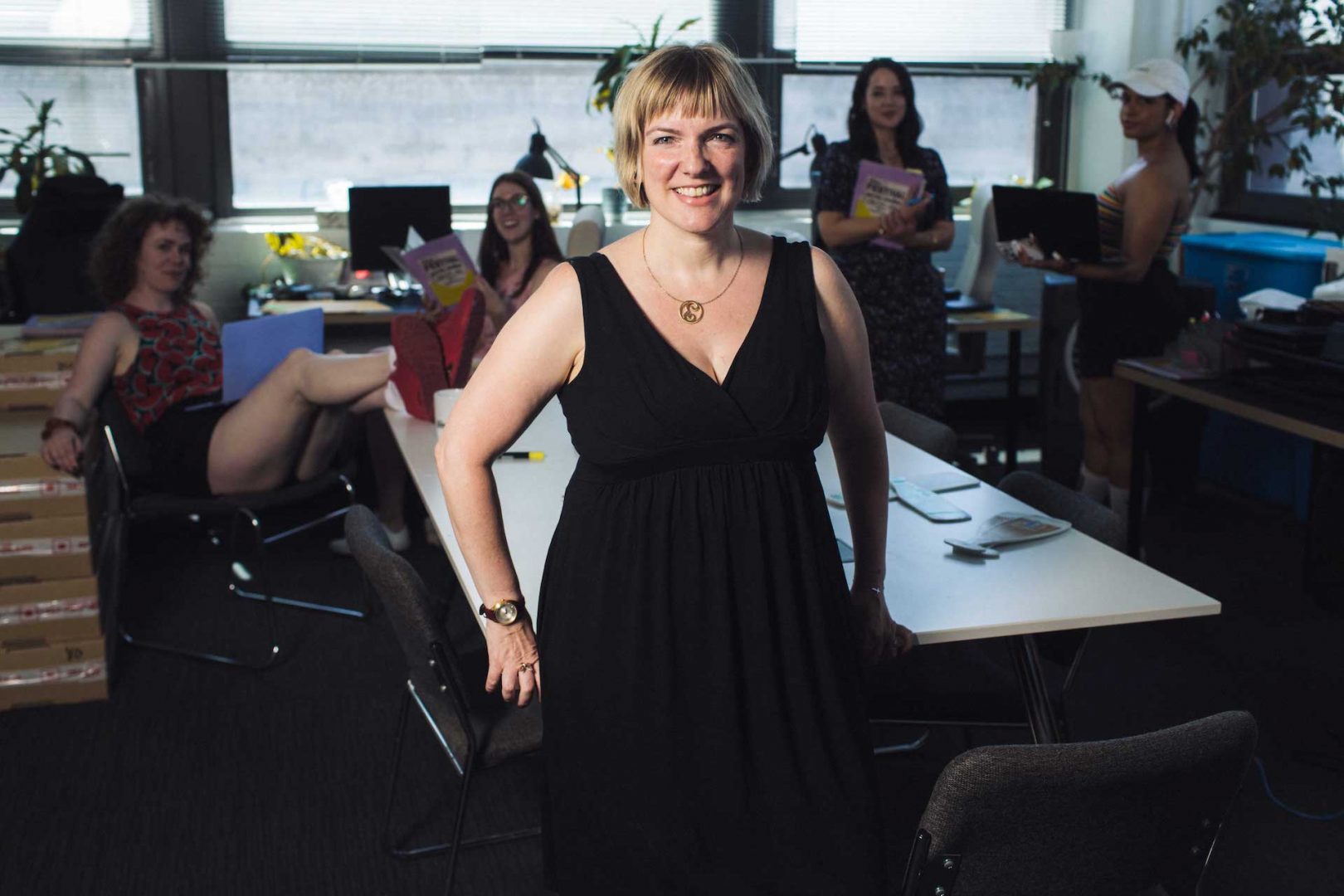By Meghan Yuri Young Photography: Max Powers As she oversees the vision of Toronto Fringe, executive director Lucy Eveleigh is tasked with simultaneously maintaining the theatre festival’s original mandate of accessibility and redefining what that…
By NowPlayingToronto
By Meghan Yuri Young
Photography: Max Powers
A lot has changed since the Toronto Fringe Festival was founded in the late 1980s. Some venues where productions were staged have closed, or changed their names. New ones have opened. The topics theatre-makers write about have taken on new directions. The theatre-makers themselves continue to evolve. But over 30 years since its launch, the essence of Ontario’s largest theatre festival remains the same: It is for the people by the people.
Today, the person helping to maintain this adage is Lucy Eveleigh, who, interestingly enough, has gone through quite a few changes herself (including a new family addition and transitioning back to the workplace). As Toronto Fringe’s executive director, Lucy oversees the direction of the entire organization. This includes ensuring the festival retains its essence of being inclusive and accessible — while reimagining how that looks in today’s climate.
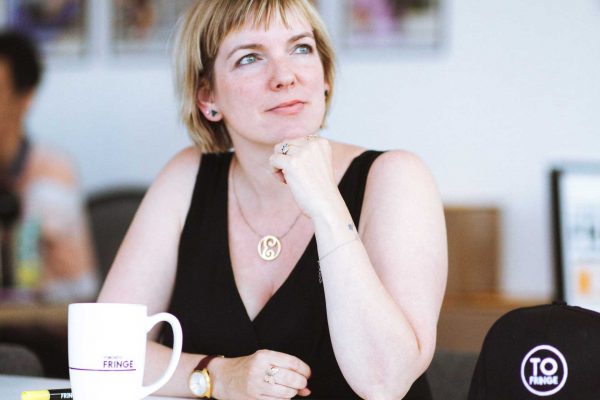
Meghan Yuri Young (MYY): We were chatting about this earlier, but now I spy a couple of cuties on your laptop. Also, I see some fun little toys and a baby seat tucked in the corner of your office here at Fringe headquarters. You’re a mom of two!
Lucy Eveleigh (LE): It’s funny; I think about when I first started at Fringe and I was newly pregnant with my first one. I was like, “Oh my God, I just got this job. What am I gonna do?” That time around, I took six months of maternity leave and then came back. Fast forward seven years later, and I’m now the executive director [and bringing my second baby into the office all the time].
And it’s good because we’re part of this Balancing Act program [which supports caregivers across the performing arts sector]. At the end of the day, we’re whole people, right? Especially the arts and culture community, we want to embrace who we are. Here, you don’t have to leave who you are at the door. We want everybody to be able to honour that and make space for that. It just makes people better at their work, you know? For instance, people know I’m a mother and that’s just one facet of who I am.
MYY: That connects so perfectly into my interpretation of what the Fringe Festival is. Hearing you speak about balance, what I’m also hearing is “accessibility.” But before we get into why I believe Fringe does so much for the accessibility of performance art in this city, can you tell us a bit more about yourself and what you do?
LE: Of course! I’m Lucy Eveleigh, and I’m the executive director of Toronto Fringe. I oversee the big picture, really. I’m involved with making sure there’s money coming in, our strategic planning, and the visions for the organization. We run two festivals throughout the year as well as other events and opportunities. The main things we’re known for is Toronto Fringe and the Next Stage Festival, which is a curated festival.
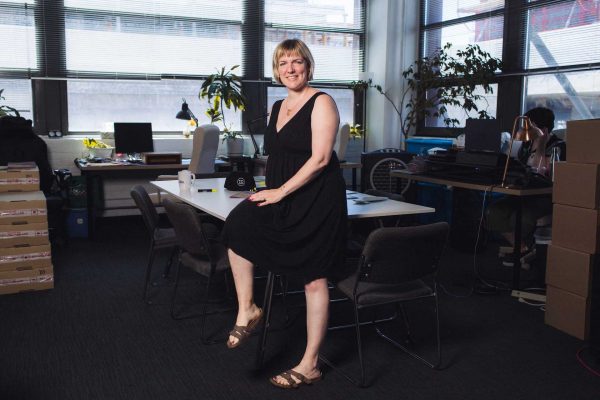
Also, we’re a lottery. Fringe has always been a lottery because we’re part of the Canadian Association of Fringe Festivals and that’s one of their mandates. Fringe is trademarked in Canada. You cannot call yourself Fringe unless you live by the tenets described by that association. One of which is, your festival has to be a lottery, or first come, first served, and you have to return the box ticket money back to the artists. We’re also not artistically involved with what they do on stage. As long as it’s legal, anyone can do anything.
So, on a few levels, the gatekeepers are removed a bit. Then, 2020 came around. Previously, we’d always been like, “Oh, we’re accessible. Anyone can do the Fringe,” but we were then starkly aware that it was very white. So, we implemented, into our 2021 digital festival, a two-phase lottery.
MYY: What did that mean for representation?
LE: It meant that we ensured 50 per cent of slots were held back for Black, Indigenous, and people of colour, while the remaining 50 per cent were open to everyone.
MYY: I was familiar with Fringe, but I never knew that it operated on a lottery system. I’m excited to spread the word so that more people are able to throw their name in to get the opportunity to share their work.
LE: It’s about actively seeking that engagement and those communities that haven’t had access to whatever it is they would benefit from. And it’s about education and outreach. You’re not the first person that didn’t know that about Fringe. It’s very niche, and I think being able to expand on part of that is marketing. It would be amazing to have way more marketing dollars to spread our name across the city. Then also, outreach, like going into schools, which we haven’t been able to do for the last two years, going into communities and finding ways to build.
MYY: Do you find that the Fringe Festival often has a theme that comes out?
LE: There’s oftentimes themes that come out by accident. But, mostly, it’s a variety. For instance, we have KidsFest — programming just for the little ones and families. We’ve had a whole bunch of musicals, a bunch of dance shows, lots of storytelling, one-person shows, and then lots of comedy. There’s always something for everyone. But I never, at this stage of the game, talk about what shows you should see because I like to be fair to all of them.
That said, reviews and word of mouth are great ways to figure out what to check out. Otherwise, with Fringe, it’s always, “Expect the unexpected.” I always encourage audiences to go and see something that they don’t know anything about. To that point, we have a random show generator on our website! You just click a button and a show pops up. You can read about it and decide whether you want to go or not.
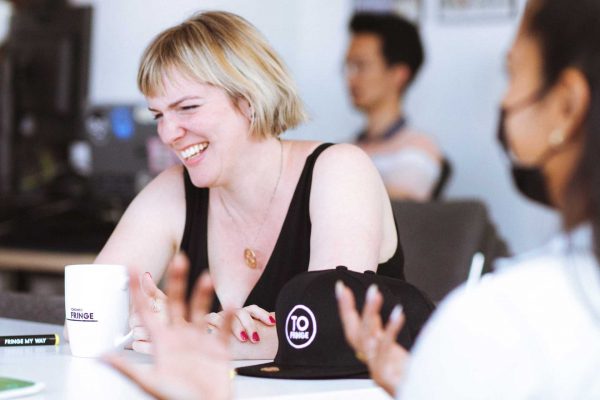 MYY: So, the lottery never ends!
MYY: So, the lottery never ends!
LE: If you’re an audience member who doesn’t know how to Fringe, come .. meet one of our volunteers or one of our staff and talk through the program. It can be a bit overwhelming. We’re really aware of how some folks who pick up that program won’t know where to start and won’t choose to see anything. So, we’re trying to make it more accessible.
MYY: I love how you’ve turned Fringe into a verb.
LE: That’s a big thing, to “Fringe.” How you Fringe is up to you. We have tips in the program. But how you Fringe is unique to you.
Fringe has always been a statement. The first one was in response to something. A lot of festivals started up in response to what was happening in their city. Even in Toronto, people were feeling like they were missing out on the art that was happening, that it was behind closed doors, red tape, gatekeepers. So, that’s where Fringe started. For the people, by the people.
MYY: It’s so important, having a response to a need like that. I’m actually curious, speaking of needs and community, what brought you to Toronto?
LE: I’m from Somerset in the southwest of England. I came to Toronto, for the first time, when I met a Canadian boy in London. The thing is, I had this big farewell. I quit my job. I had a big party. I came to Toronto and then he had been cheating on me, and I felt like an idiot. But I was too proud to go back. Then I remembered, when I moved, my mom was like, “Go, but don’t go for him. Go and make it your own.” So, as soon as I got off the plane, before I knew all of the cheating, I joined an improv group and I started auditioning for things.
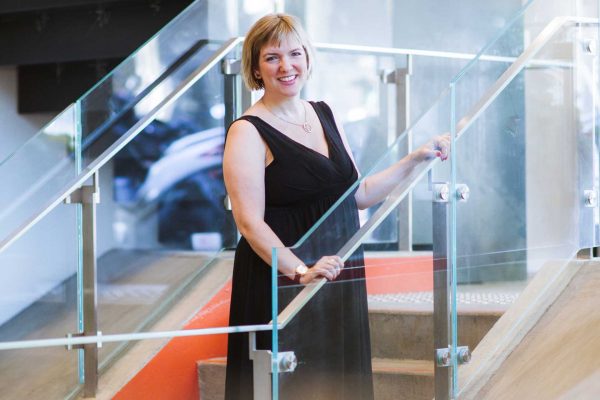 When we broke up, I had made some really great friends and I was like, “Okay, well I’m gonna do this.” So, I stayed for three or four years, on and off, and then I applied for my permanent residence but failed the test by one point. I went back to England and worked for a couple years until I got offered a job at Just For Laughs in Montreal! Instantly I was like, “I guess I’m moving to Montreal!” It’s where I met my now-husband, but I knew I wanted to move back to Toronto. Montreal was great, but I’d reached my growth there and felt I needed to go back to Toronto. We’ve been here for over 10 years now!
When we broke up, I had made some really great friends and I was like, “Okay, well I’m gonna do this.” So, I stayed for three or four years, on and off, and then I applied for my permanent residence but failed the test by one point. I went back to England and worked for a couple years until I got offered a job at Just For Laughs in Montreal! Instantly I was like, “I guess I’m moving to Montreal!” It’s where I met my now-husband, but I knew I wanted to move back to Toronto. Montreal was great, but I’d reached my growth there and felt I needed to go back to Toronto. We’ve been here for over 10 years now!
Even though I’d had a great time in Toronto before, it was hard to get back into it — especially theatre work. And then, I got a job at Necessary Angel Theatre Company. I worked from there to SummerWorks and eventually made it here at Fringe.
MYY: That’s such a fun story and fun journey. The fact that you went home, built another life and then your Canadian paperwork comes around again and you’re instantly like, “I’m going back,” that’s so wonderfully spontaneous. What ultimately brought you back to this city and kept you here?
LE: I haven’t visited all of Canada but Toronto, for me, is the place that I want to be. A lot of it was coming from London, England. I mean, London is an incredible place. I’ve always felt that if you can live in London, you can live anywhere.
Ask anyone in Canada, they’ll say Toronto is a big, busy place. But compared to London, I was like, “This is chill.” When I first moved to Toronto, I remember everyone being so friendly here. And then I spoke to people outside of Toronto, and they were like, “What are you talking about? Toronto’s not friendly.” I was like, “Are you kidding? Toronto’s so friendly!” Partly, I think I’m friendly, so maybe that’s it.”
MYY: I feel the same way!
LE: I felt this from the beginning. [Toronto’s] multicultural; there is an accessibility to it. You can walk to so many places, you can go to theatres and not spend a fortune.There’s opportunity for growth. There’s just so much happening, you know?
MYY: So much room for growth here! But, I mean, you can still have fun too! How do you enjoy the city in your spare time?
LE: I’m gonna take some time off after the festival and do some day trips, explore the city a little bit. I want to take [my kids] to the ROM, the AGO and the Science Centre. There’s so much stuff for kids to do! And, I want to go to the movies. I need a proper movie date with my husband!
MYY: That’s something I didn’t give up! I love going to the cinema, and I’ve been noticing some great movies playing at the IMAX theatre in Ontario Place.
LE: I will check that out! I want to go out for dinner. Toronto’s got some amazing restaurants, right? I live on the Danforth. It’s really great around there. I just want to be in the city.
MYY: Is there anything else you want to add before we wrap up?
LE: Fringe, for me, is really about the community. I [always] just hope that the people that can come out do come out and support these artists and support this organization. We’ve proved that, without us, the city is a slightly dimmer place.
Each year, the Toronto Fringe Festival stages productions by theatre companies from around Canada and the world. Don’t forget that Toronto’s events organizers and cultural organizations also host a diverse range of festivals all year. Once you’ve browsed the upcoming events, check out our blog about independent and imitate theatre productions across the city.

